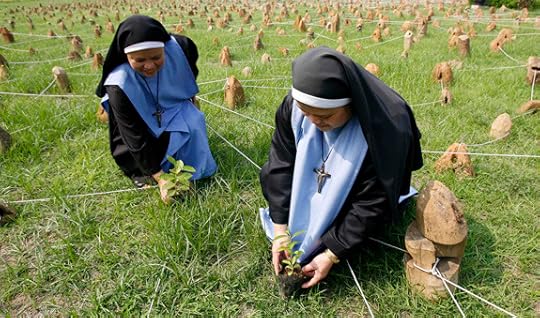Catholics, the Environment, and a “Culture of Waste”

Catholics, the Environment, and a “Culture of Waste” | J. J. Ziegler | Catholic World Report
Recent popes have highlighted the necessity of caring for the environment—but how does what they say differ from secular environmentalism?
On June 5, Pope Francis devoted his
Wednesday general audience to the environment. Decrying the “culture of
waste,” he linked disrespect for the environment to disrespect for human life:
This “culture of waste” tends to become a
common mentality that infects everyone. Human life, the person, are no longer
seen as a primary value to be respected and safeguarded, especially if they are
poor or disabled, if they are not yet useful—like the unborn child—or are no
longer of any use—like the elderly person.
Pope Francis’s concern about the environment is not novel:
Venerable Paul VI reflected on the topic in Octogesima
Adveniens (no. 21), his 1971
apostolic letter on the 80th anniversary of Pope Leo’s XIII’s landmark social
encyclical Rerum Novarum.
Early in his pontificate, in his 1979 apostolic letter Inter Sanctos, Blessed John Paul II
proclaimed St. Francis of Assisi the heavenly patron of those who promote
ecology. At various points in his pontificate, John Paul directed his attention
to ecological concerns, most significantly in his 1987 encyclical Sollicitudo
Rei Socialis (nos. 26, 34), his 1990 Message
for the World Day of Peace, and his 1991 encyclical Centesimus
Annus (nos. 37-40), in which he linked the environment to a “human
ecology” whose “first and fundamental structure” is “the family founded on
marriage” (no. 39).
It was Pope Benedict, however, who earned the nickname “the
green pope,” in part because of the installation of solar panels above some
Vatican buildings and in part because of the Vatican’s attempt, which
proved ill-fated, to become the world’s first carbon-neutral nation.
Of more enduring significance is Pope Benedict’s teaching
on the environment, most significantly his 2009 encyclical Caritas
in Veritate (nos. 48-52) and his 2010 Message
for the World Day of Peace. The pope emeritus reflected on ecology in a
number of speeches as well, from his 2008
address to the Roman Curia, in which he discussed creation and gender, to
his 2010 “state
of the world” address to the diplomatic corps, in which he said that
concern and commitment for the environment
should be situated within the larger framework of the great challenges now
facing mankind. If we wish to build true peace, how can we separate, or even
set at odds, the protection of the environment and the protection of human
life, including the life of the unborn? It is in man’s respect for himself that
his sense of responsibility for creation is shown.
“Today, more than ever, it appears clear to us that respect
for the environment cannot fail to recognize the value and inviolability of the
human person in every phase of life and in every condition,” he likewise said in
a 2011 address. “Respect for the human being and respect for nature are one
and the same, but they will both be able to develop and to reach their full
dimension if we respect the Creator and his creature in the human being and in
nature.”
Carl E. Olson's Blog
- Carl E. Olson's profile
- 20 followers



